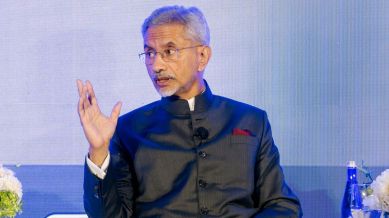Stay updated with the latest - Click here to follow us on Instagram
Amid H-1B visa fee salvo, Jaishankar says, ‘demands cannot be met by national demographics alone’
S Jaishankar also said nations must create a “more acceptable, contemporary, efficient” model that allows labour mobility across distributed global workplaces.

Days after US President Donald Trump’s announcement of new $100,000 fee on H-1B visas, External Affairs Minister S Jaishankar on Thursday called for the creation of a “global workforce” model that reflects today’s shifting realities, pointing out that national demographics alone cannot meet rising demands for talent.
Speaking at the ‘At the Heart of Development: Aid, Trade, and Technology’ event organised by the Observer Research Foundation (ORF) on the sidelines of the UN General Assembly in New York, Jaishankar said that workforce distribution must be reimagined for a multipolar and turbulent world.
monthly limit of free stories.
with an Express account.
“Where that global workforce is to be housed and located may be a matter of political debate. But there’s no getting away from the reality. Demands cannot be met in many countries purely out of national demographics,” he said.
Jaishankar also said nations must create a “more acceptable, contemporary, efficient” model that allows labour mobility across distributed global workplaces.
He predicted new trade arrangements and partnerships driven by necessity rather than tradition. “Countries today will feel the desire, sometimes even the compulsion, to have new partners and new regions,” he said. While global turbulence is increasing, Jaishankar insisted that trade “does find a way,” aided by improved infrastructure, digital platforms, and connectivity.
The minister also pointed to India’s push for greater self-reliance and capacity-building, arguing that multi-polarity must be constructed through national experiences that can be shared abroad. He pointed to India’s Digital Public Infrastructure as an example of a model “far more absorbable, relevant, transposable” for many societies than European or American systems.
Warning of heightened unpredictability and volatility in global politics, Jaishankar said resilience is now the central proposition in diplomacy. “You have to de-risk, hedge, safeguard yourself against unforeseen contingencies, and really build policy and plans around that. That’s a very big challenge for the entire world,” he said.
He added that de-risking must go beyond supply chains to also protect against over-dependence on markets and connectivity, as the global economic chain becomes “far more risky and difficult to assume.”
(With Inputs from PTI)